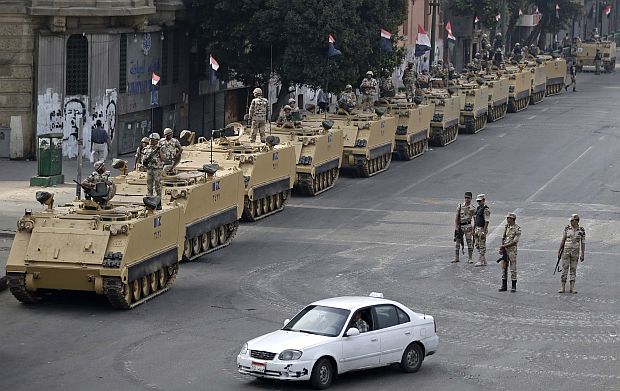
In this Friday, Aug. 16, 2013 photo, Egyptian army soldiers take their positions on top and next to their armored vehicles to guard an entrance of Tahrir square, in Cairo, Egypt. (AP/Hassan Ammar)
London, Asharq Al-Awsat—Reports continue to emerge that the White House intends to suspend part of the USD 1.3 billion aid it offers to Egypt annually following a policy review taken after the ouster of Islamist president Mohamed Mursi and a crackdown against the former ruling Muslim Brotherhood by the military-backed interim government.
Washington has said that it intends to announce the future of its “assistance relationship” with Egypt in the coming days, however military and economic experts have agreed that any US aid cuts will be “symbolic” and would have little effect on the country.
In a speech to the UN General Assembly in New York last month, US President Barack Obama criticized the actions of Egypt’s military-backed interim government, saying it had “made decisions inconsistent with inclusive democracy.”
US support would “depend upon Egypt’s progress in pursuing a more democratic path,” he added.
Paul Gamble, Director of the Africa & Middle East team of Fitch’s Sovereign Ratings Group, told Asharq Al-Awsat: “The aid cuts won’t have an impact at a macro-economic level, because these are effectively credits that are awarded to the Egyptian military for the purchase of US military equipment, so this money does not directly enter the economy.”
He said, “This does not mean any less money is going to the Egyptian economy, so it really does not have an impact,” adding, “It’s more a political gesture.”
Fitch had downgraded Egypt’s long-term foreign and local currency ratings from ‘B’ to ‘B-‘ just days after Mursi’s ouster. Prior to Mursi’s ouster, the White House had requested USD 1.55 billion in assistance for Egypt for 2014: USD 1.3 billion in military aid, USD 250 million in economic aid. The Obama administration has subsequently said it would suspend approximately USD 585 million of the military aid to post-Mursi Egypt pending a wider policy review.
“Since we downgraded Egypt [in July] we’ve seen a large inflow of funds from Saudi Arabia, UAE, and Kuwait, amounting to approximately USD 7 billion. That’s played an important role in building up foreign exchange rates and the supporting the exchange rate and the economy,” he added.
Stephen Glain, a writer and journalist who has written widely about the Arab economy, concurred, telling Asharq Al-Awsat: “The Egyptian army has its fingers in a lot of economy sectors, manufacturing, services-Egyptian Airways. I don’t think they’re going to suffer that much, this is more important symbolically, on a diplomatic scale.”
US aid is seen as a critical pillar of the 1979 Egypt-Israel peace treaty, and US President Barack Obama’s decision to review aid—particularly military aid—to Egypt could have a major impact on Egyptian foreign policy towards Tel Aviv.
However Glain, who is the author of Mullahs, Merchants, and Militants: The Economic Collapse of the Arab World, dismissed such claims. He told Asharq Al-Awsat: “If the Muslim Brotherhood was smart enough to respect its peace treaty with Israel, I have to think the army is too,” adding, “From my experience, the officer class in Egypt is well aware of the importance of securing calm along its border with Israel.”
US officials confirmed that aid cuts will hold up the delivery of several types of military hardware to the Egyptian military, including tanks, helicopters, and fighter jets. However this will not affect aid for counterterrorism operations or for border security issues involving the Sinai Peninsula and Gaza Strip.
Lockheed Martin, one of the largest US defense contractors, halted the delivery of four F-16 fighter jets to Egypt earlier this year, having previously delivered eight out of a 2009 order of 20 planes.
Regarding speculation that the US military cuts would include vital maintenance of Egyptian military equipment bought from the US, Glain said: “That would be significant, and it would be particularly punitive, because maintenance and spare parts is a big part of this and extremely important for military readiness. Egypt has a critical mass of weaponry to maintain their deterrent capability; however it’s important that they have the necessary spare parts.”
He added that Egypt could conceivably keep its armed forces in a state of repair even without US assistance, telling Asharq Al-Awsat: “I would not underestimate their engineering competence, I’m sure they can maintain a minimum amount of readiness without help from the US, I’d be more concerned about spare parts.”
